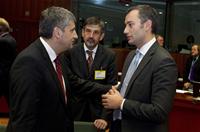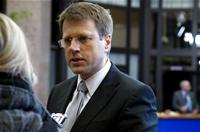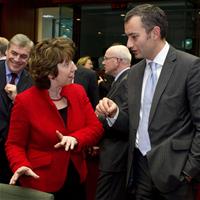Bosnia, its neighbours and EU
Evelyna Topalova, March 7, 2011
 Who else but the neighbours would know best the importance of Bosnia's EU integration? The rhetorical question comes from the foreign ministers of Bulgaria, Austria and Slovenia in a joint article published in the Nezavisne Novine daily during the weekend. The publication is actually the message which the three top diplomats would deliver in Sarajevo on behalf of the EU.
Who else but the neighbours would know best the importance of Bosnia's EU integration? The rhetorical question comes from the foreign ministers of Bulgaria, Austria and Slovenia in a joint article published in the Nezavisne Novine daily during the weekend. The publication is actually the message which the three top diplomats would deliver in Sarajevo on behalf of the EU.
The message of the three diplomats to the local leaders is that Bosnia and Herzegovina (BiH)'s place is within the EU but the country urgently needs to form new governing bodies at all levels in order to continue with the reforms.
Five months after the parliamentary elections BiH still lacks central level government and a government in the largest of the two entities - the Federation of Bosnia and Herzegovina (FBiH) - due to Croats' reluctance to join the offered coalition platform at FBiH level. Under the Dayton Peace Agreement, that put an end to the 1992-1995 Bosnian war, the country was divided into two entities - Federation of Bosnia and Herzegovina and Republika Srpska which are united by weak central institutions. The authorities at central level (parliament and government) cannot be constituted unless coalition agreements at local levels are reached. This complicated governing structure is among the reasons behind the political deadlock not only in the post-election period but it has been hampering for years the process of decision making related to vital issues.
"If the country wants to be a credible interlocutor of the EU, it should speak in one voice. Governing bodies with a common vision for the European future of the country should be established without any delay," the three diplomats say.
They highlight that Bosnian leaders should focus on implementation of the goals related to EU integration that would benefit all Bosnian citizens. The efforts should be focused on economy, creation of new jobs, observing the rule of law, fight against corruption and organised crime. Among the priority tasks should also be the  population census. The three foreign ministers stress that nationalism and negative rhetoric are not in line with the European values and do not help BiH on its path towards Europe.
population census. The three foreign ministers stress that nationalism and negative rhetoric are not in line with the European values and do not help BiH on its path towards Europe.
If local leaders take on seriously the implementation of these tasks, the country would be able to apply for EU membership by the end of the year. Progress is indeed possible, which has been proved by the EU visa liberalisation process that entered into force for BIH as of the end of last year. This success proves that if there is political will, an agreement can be achieved, the three diplomats note.
The foreign ministers warn that Bosnia could drag behind its Balkan peers in the EU integration process if a consensus on the vital issues is not achieved. "The nearest future of Bosnian citizens depends on the political will and the courage of their leaders which are needed to break the political deadlock and to implement the remaining reforms. As good neighbours and friends of BiH we are ready to support the country during its difficult but efforts-worthy European path," the foreign ministers of Bulgaria, Austria and Slovenia say in conclusion in their joint article.
 The European Union is currently preoccupied by the problems in North Africa and the Middle East. That's why, on the initiative of Bulgaria, the three countries (which are the most active EU members in the region), have decided to remind the society and political key factors in Bosnia that the bloc remains committed to the country's problems among fears of possible disintegration of the three ethnicities country.
The European Union is currently preoccupied by the problems in North Africa and the Middle East. That's why, on the initiative of Bulgaria, the three countries (which are the most active EU members in the region), have decided to remind the society and political key factors in Bosnia that the bloc remains committed to the country's problems among fears of possible disintegration of the three ethnicities country.
Foreign Ministers of Bulgaria and Slovenia (Nickolay Mladenov and Samuel Zbogar) have already arrived in Sarajevo. The Austrian top diplomat Michael Spindelegger failed to join them. The two ministers will hold talks with representatives of all parties in the country, including with Bosnian Serb leader Milorad Dodik, Bulgarian Foreign Ministry spokesperson Vessela Tcherneva told euinside.
 Bakir Izetbegovic, Andrej Plenkovic | © Council of the EU
Bakir Izetbegovic, Andrej Plenkovic | © Council of the EU Aleksandar Vucic, Recep Tayyip Erdogan | © Serbian Presidency
Aleksandar Vucic, Recep Tayyip Erdogan | © Serbian Presidency Jean-Claude Juncker, Zoran Zaev | © European Commission
Jean-Claude Juncker, Zoran Zaev | © European Commission